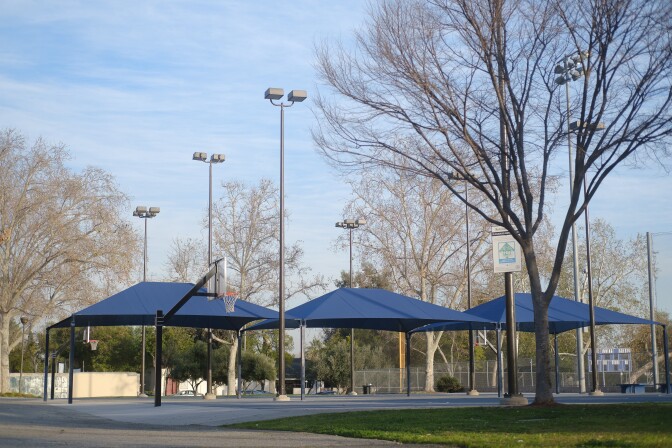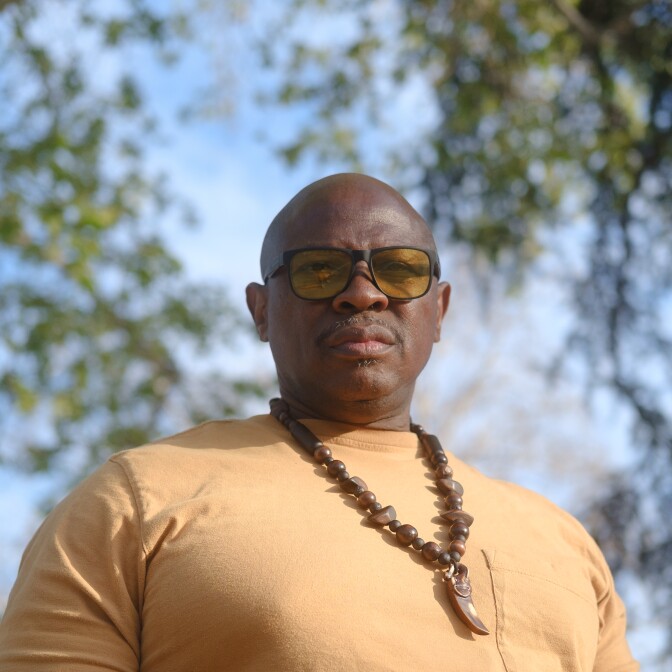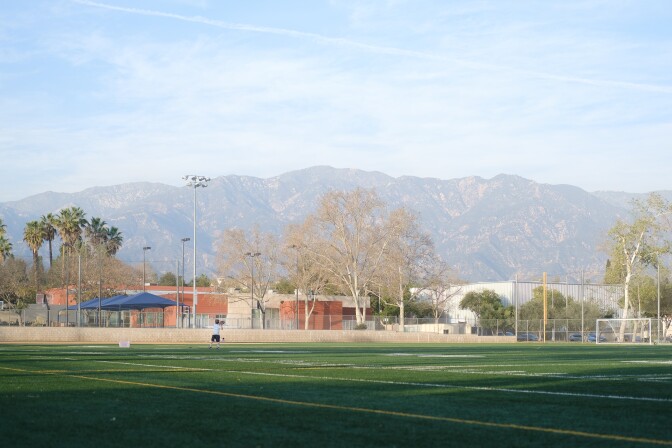This story is free to read because readers choose to support LAist. If you find value in independent local reporting, make a donation to power our newsroom today.
To Curb Rising Shootings In Pasadena, Gang Interventionists Grapple With Cycle of Jail And Death

On an unseasonably warm January night, young children threw baseballs on the grass at Robinson Field in Northwest Pasadena as coaches and family members looked on.
Youth football coach Teandra Pitts’ season was over. She sat on the bleachers and collected football equipment from young players who leapt out of cars idling on the dark streets. Teenagers parked nearby and played music.
Pitts recalled a day last October when she arrived for practice and heard a completely different sound.
“I came in, and all I heard was shots fired,” said Pitts, who has coached the Pasadena Giants for six years and played at Robinson Park as a kid.
She described the sound of gunshots erupting across the field. “All we knew what to do was just tell them, ‘Hey, like an earthquake drill: drop, cover, and come over here to where the concrete was,’” she said.
More than 100 kids dropped to the dirt and crawled to a shed in the field — including Pitts' 11-year-old son, Alijah. “It kind of makes me scared a little,” he said of the incident.

It was so traumatizing that Pitts stood up at an emergency community meeting called by city officials after the shooting and demanded more resources.
“We want to feel safe. I want the families to feel comfortable when they come to our park,” she said.
Pasadena is now leaning heavily on gang interventionists to curb shootings, which the Pasadena Police Department says rose more than 20% last year.
The city has hired four interventionists to mediate conflicts between gangs and talk down people who want to retaliate with gun violence. One interventionist — Flavio Andrade — was hired this year specifically to work with a growing number of Latino gangs, a need cited by the other gang interventionists, who are all Black men.
There have been a handful of fatal shootings in the area around Robinson Park — including the killing of 13-year-old Iran Moreno Balvaneda right before Thanksgiving. He died from a stray bullet while playing video games in his room.
‘Sometimes We Have To Let Things Play Out’
“At the end of the day, gangs is here,” said interventionist Mark Sutton. He said you can’t sweep it under the rug, especially as Pasadena transplants start to expand into neighborhoods that bear the bulk of gun violence — like the neighborhoods near Robinson Park.
“Pasadena’s a very diverse city,” said Andrade. “And we’re gonna sit here, and try to hide certain things? It’s not gonna work out.”
Both Sutton and Andrade are logical choices for this undertaking: they’re both former gang members. In his youth, Sutton co-founded a local Bloods chapter, Pasadena Denver Lanes. It’s one of over a dozen Pasadena gangs.
Sutton said the work is complicated. He said it’s around-the-clock phone calls and meetings with rival gangs. “We just find a way to have a conversation with them to get them to stand down,” he said.
Because of what I’ve done, some of my younger homeboys will be like, ‘Imma listen to him.’ We’re in a position of leadership.
But it takes a lot of time, and a lot of trust, to do that. “Because of what I’ve done, some of my younger homeboys will be like, ‘Imma listen to him.’ We’re in a position of leadership,” Andrade said.
Last December, Sutton helped negotiate a stand down between gangs that lasted for weeks. But he acknowledges that sometimes there’s only so much he and his colleagues can do.
“Just being honest, sometimes we have to let things play out, and then we find the right opportunity to step in,” he said.
Sutton tells gang members that the police and city are doing their research on them: “They know everything about us. They know what type of cars we drive, clothes we like, everything — so why are we still doing the same thing and making ourselves a target?”
And he knows this firsthand — he went to prison for 26 years on a murder charge.
‘There’s A Third Alternative’
“In the gang lifestyle, the two avenues is always gonna be, you either gonna go to jail, or you’re gonna die,” said interventionist Ricky Pickens. “But there’s a third alternative, which is what we’re presenting. You have a way out, if you want to get out. If you want to change your life.”
The interventionists help gang members get jobs, secure apartments and rely less on the lifestyle. Sometimes they slip people cash to help make ends meet.

“We need to start doing something different — let’s talk about getting businesses,” Sutton said, pointing to motorcycle clubs that rebranded and started organizing toy drives.
“You don't have to be a part of it where it is toxic, right? Where it's tearing your community down,” he said.
“Walking away is not necessarily walking away where I turn my back on my homeboys, no,” said Pickens. “It’s to go get myself together, so I can come back and present a more positive role model to you.”
As a way to demonstrate that there’s life outside the violence, the interventionists are organizing a three-on-three basketball tournament at Robinson Park. They’re inviting the local gangs to participate, as well as companies that are hiring to set up booths.
Walking away is not necessarily walking away where I turn my back on my homeboys, no. It’s to go get myself together, so I can come back and present a more positive role model to you.
At a planning meeting in February with the gang interventionists and Pasadena parks staff, there were a few clear points of tension in an otherwise positive meeting. One was the subject of the police. The interventionists asked for a limited police presence, arguing that it would discourage gang members from participating.
Parks staff wondered how they could ensure that the event would be safe. That’s the interventionists’ job, said Pickens — to speak to gang leaders in the weeks leading up to the event to reiterate that it will be a community-focused event to forge opportunities, not rehash old beefs.

A Dip In Crime — But Then A Surge
Pickens, who heads up the interventionists’ team in Pasadena, said he got involved in the work in the early 2000s after growing up around gangs in the city and watching several of his friends die.
He worked with former Pasadena Police Department Chief Barney Melekian on a homicide reduction program called No More Dead Children. “[The city] had averaged 20 or more homicides a year for decades,” said Melekian, who joined the department in the mid 1990s. By the time Melekian left in 2009, that number had dropped to single digits.
“Ricky Pickens was incredibly helpful because he knew everyone in the community,” Melekian said. But controversial police shootings like the killing of 30-year-old Maurice Clark in 2004 destroyed much of the trust gained between many Black Pasadena residents and police.
Melekian asked the FBI to investigate that shooting. “I've said for most of my career that 20 years of hard work isn't going to undo 300 years of history,” said Melekian, now interim chief of the Santa Barbara Police Department.
Pickens eventually decided to stop working directly with the police. “It’s counterproductive,” he said, adding that it’s hard to work with both gangs and police.
In 2020, he did re-engage with Pasadena, but under a contract with the city, rather than with the police department. “We can’t arrest our way out of this,” Pickens remembered city officials telling him. “The same thing Barney Melekian said in the early 2000s.”
We’re dealing with historically some age old beefs. And it’s like with any transition or process of change — it doesn’t happen overnight.
Former Pasadena City Manager Steve Mermell said the interventionists have “had a lot of success, and you don’t always know it. Because when you don’t see violence … you just kind of take that for granted.”
Last July, Pickens, Sutton and fellow gang interventionist DeAndre Scott gave a presentation on their work to the Pasadena City Council Public Safety Committee. They said the police department recorded a 26% decrease in violent crime beginning in April 2021, which they attributed to the fact that the city had had hired interventionists in Dec. 2020.
“You’re either going to pay for violence interrupters to help prevent the violence, or you’re going to pay police officers to do more investigations,” Pickens said at the meeting.
But the downturn didn’t last. Despite the dip in violent crime early in 2021, the police department recorded 73 shootings for the year, compared with 60 in 2020 — a 22% increase. Six people were killed by gun violence last year.
Pasadena also recently started using ShotSpotter, a controversial gun detection system that drew praise from some city officials and ire from critics who argue it stigmatizes neighborhoods of color and can lead to biased stops and searches.
'Dealing With…Age-Old Beefs'
Things were generally more calm in Pasadena as the new year began. “When you have a city this size, and the type of gang wars that we've been having, that quietness is not by coincidence,” Pickens said, citing the interventionist’s work behind the scenes.

But the quiet was shattered on the late January day I met youth coach Teandra Pitts in Robinson Park. A few hours before we got together, a 14-year-old boy was shot while riding in a car.
I called Mark Sutton. He was already working the phones with colleague Flavio Andrade to prevent a retaliatory shooting. “A lot of times it works, and then sometimes, it don’t,” Sutton said.
“What is it going to take to have the police presence?” Pitts asked. “We got baseball going on right now — we’ve got no police presence and it’s pretty dark over here.” She echoed the calls of many Pasadena residents nearby who are tired of the violence.
“We’re dealing with historically some age-old beefs,” interventionist Pickens said in response to that concern. “And it’s like with any transition or process of change — it doesn’t happen overnight.”
But Pitts sees no end to the violence without more police in and around Robinson Park. Last October’s shooting ended up being one of three times she and the kids she was coaching heard gunshots while practicing or playing.
Pitts said her team even heard the shots in November that killed 13-year-old Ivan Moreno Balvaneda a few blocks away.
I asked if she would have qualms about a heightened police presence around her coaching staff, which is made up primarily of Black men. Pitts said no. They’ve never been harassed or racially profiled by police at the field, she said.
The child who was shot nearby died two days later. It’s the latest reminder of how hard it is to break the cycle of violence.
“Unless you grew up here, you will never understand it,” Pitts said.
An earlier version of this story misstated the time period in which Pasadena police reported a 26% drop in violent crime.







